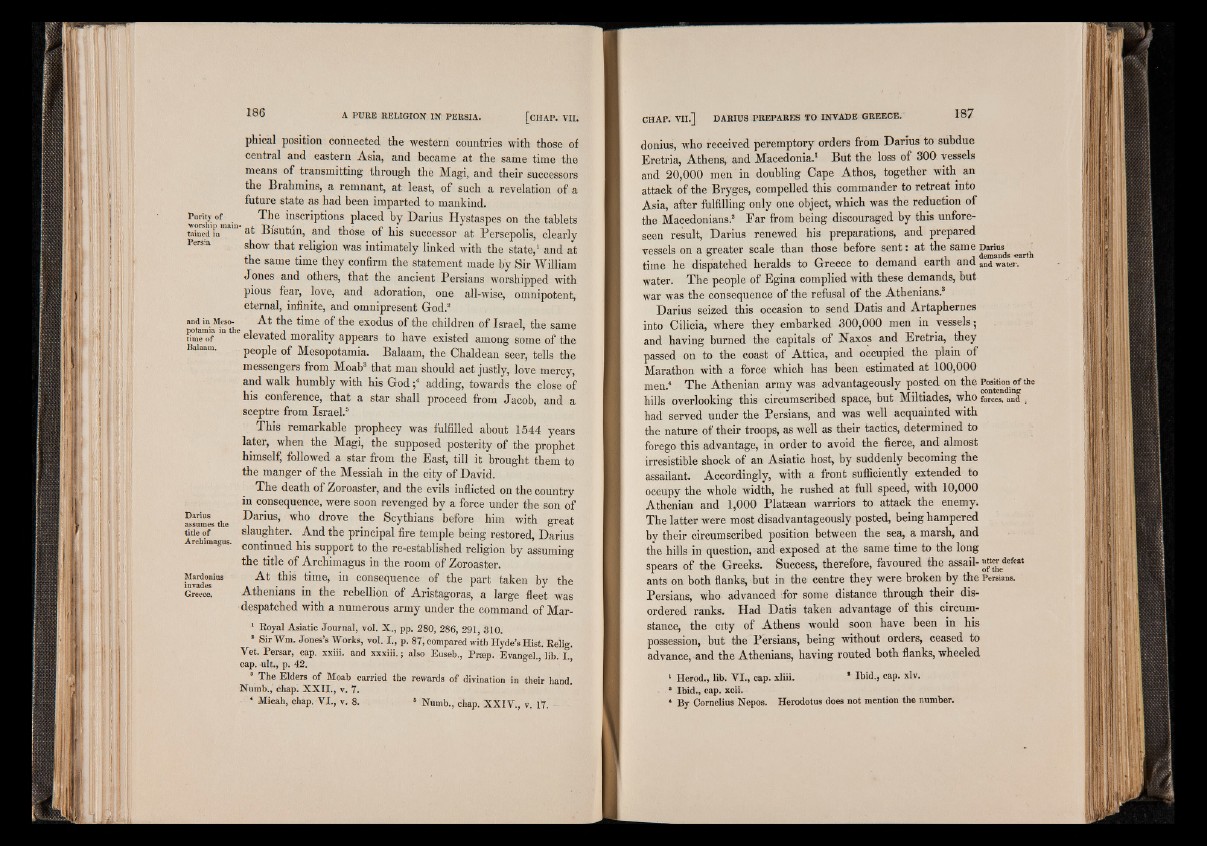
phical position connected the western countries with those of
central and eastern Asia, and became at the same time the
means of transmitting through the Magi, and their successors
the Brahmins, a remnant, at least, of such a revelation of a
future state as had been imparted to mankind.
worship* main inscriP^ons placed by Darius Hystaspes on the tablets
tained in Bisutun, and those of his successor at Persepolis, clearly
Persia show that religion was intimately linked with the state,1 and at
the same time they confirm the statement made by Sir William
Jones and others, that the ancient Persians worshipped with
pious fear, love, and adoration, one all-wise, omnipotent,
eternal, infinite, and omnipresent God.2
an d in Meso- At the time of the exodus of the children of Israel, the same
potamia in the j J v 1 v , , .
time of elevated morality appears to have existed among some of the
Balaam. people of Mesopotamia. Balaam, the Chaldean seer, tells the
messengers from Moab3 that man should act justly, love mercy,
and walk humbly with his God ;4 adding, towards the close of
his conference, that a star shall proceed from Jacob, and a
sceptre from Israel.5
This remarkable prophecy was fulfilled about 1544 years
later, when the Magi, the supposed posterity of the prophet
himself, followed a star from the East, till it brought them to
the manger of the Messiah in the city of David.
The death of Zoroaster, and the evils inflicted on the country
in consequence, were soon revenged by a force under the son of
Darius Darius, who drove the Scythians before him with great assumes the 1 , A J
title of slaughter. And the principal fire temple being restored, Darius
86 s continued his support to the re-established religion by assuming
the title of Archimagus in the room of Zoroaster.
fuvad™'“8 At this time, in consequence of the part taken by the
Greece. Athenians in the rebellion of Aristagoras, a large fleet was
•despatched with a numerous army under the command of Mar-
1 Royal Asiatic Journal, vol. X., pp. 280, 286, 291, 310.
* Sir Win. Jones’s Works, vol. I., p. 87, compared with Hyde’s Hist. Relig.
Vet. Persar, cap. xxiii. and xxxiii.; also Euseb., Prsep. Evangel lib I
cap. -ult., p. 42.
3 The Elders of Moab carried the rewards of divination in their hand.
Numb., chap. X X I I ., v. 7.
4 Micah, chap. V I., v. 8. 5 Numb., chap. X X IV ., v. 17.
donius, who received peremptory orders from Darius to subdue
Eretria, Athens, and Macedonia.1 But the loss of 300 vessels
and 20,000 men in doubling Cape Athos, together with an
attack of the Bryges, compelled this commander to retreat into
Asia, after fulfilling only one object, which was the reduction of
the Macedonians.2 Far from being discouraged by this unforeseen
result, Darius renewed his preparations, and prepared
vessels on a greater scale than those before sent: at the same Darius / - _ _ _ , j , -i i demands «arm time he dispatched heralds to Greece to demand eartn and and waua-.
water. The people of Egina complied with these demands, but
war was the consequence of the refusal of the Athenians.3
Darius seized this occasion to send Datis and Artaphernes
into Cilicia, where they embarked 300,000 men in vessels ;
and having burned the capitals of Naxos and Eretria, they
passed on to the coast of Attica, and occupied the plain of
Marathon with a force which has been estimated at 100,000
men.4 The Athenian army was advantageously posted on the Pmitionof the
hills overlooking this circumscribed space, but Miltiades, who forces, and ,
had served under the Persians, and was well acquainted with
the nature of their troops, as well as their tactics, determined to
forego this advantage, in order to avoid the fierce, and almost
irresistible shock of an Asiatic host, by suddenly becoming the
assailant. Accordingly, with a front sufficiently extended to
occupy the whole width, he rushed at full speed, with 10,000
Athenian and 1,000 Plataean warriors to attack the enemy.
The latter were most disadvantageously posted, being hampered
bv their circumscribed position between the sea, a marsh, and
the hills in question, and exposed at the same time to the long
spears of the Greeks. Success, therefore, favoured the assail- ”[t^edefeat
ants on both flanks, but in the centre they were broken by the Persians.
Persians, who advanced for some distance through their disordered
ranks. Had Datis taken advantage of this circumstance,
the city of Athens would soon have been in his
possession, but the Persians, being without orders, ceased to
advance, and the Athenians, having routed both flanks, wheeled
1 Herod., lib. V I., cap. xliii. * Ibid., cap. xlv.
3 Ibid., cap. xcii.
4 By Cornelius Nepos. Herodotus does not mention the number.